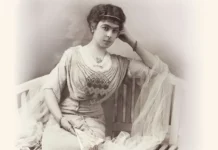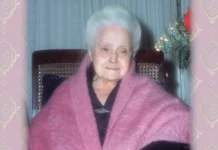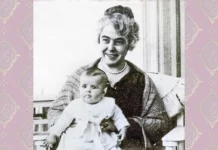While acknowledging the infinite distance separating creature from Creator, a marked likeness to the Sacred Heart of Jesus could be noted in Dona Lucilia. This was her greatest contribution toward her children’s formation.
Dona Lucilia’s boundless affection for her children did not stem from merely natural motives. It was rooted in devotion to the Sacred Heart of Jesus, to whom she prayed constantly, as her maternal words in a letter to Plinio, years later, reveal:
“I was immensely pleased to know that when you miss me you pray before my oratory! I also pray so much for you. The Sacred Heart of Jesus, our love, will be your shield and protector, beloved son of my heart!”
This devotion, coupled with the recollected environment she maintained in the home, inclined him to prayer and contemplation. Dr. Plinio recalled that frequently, upon returning home after an outing or childhood party, he would find his home immersed in an atmosphere evocative of the solemn, noble, and rich tone of the bells of the Sacred Heart of Jesus Church.
This contrasted completely with the superficiality and dissipation that had made its mark on society by the 1920s, and has steadily increased until today. This helped him grow in appreciation of Dona Lucilia’s way of being which was unchanging and profound. “Therefore, I made the resolution: I will also live like this,” Dr. Plinio concluded.

Excellent religious formation
Underpinning everything was Dona Lucilia’s heartfelt desire that her children live virtuously. This explains her efforts in providing an excellent religious formation for them.
An astute observer, she noted that while Fräulein Mathilde was a first-rate educator, she was not as mindful of the supernatural as was to be desired. This proved to be a boon for the children, for it prompted their mother to take on the lofty task herself.
To promote a pious attitude in Rosée and Plinio toward the statues she had placed in their rooms, she sometimes kissed these objects when she entered.
When he was in his eighties, Dr. Plinio still remembered being six or seven, the age at which he began to reflect more deeply on Our Lord Jesus Christ while contemplating statues of Him at home and at church and reading children’s books:
“I was convinced at a very young age that He was the God-Man, because Mama made this very clear in her narrations of Sacred History.”
Dona Lucilia’s influence upon her children was so effective that when Plinio was only four years old he used to stand on a table and teach catechism to the household servants, passing on to them what he had heard from his mother’s pious lips.
On the other hand, the children were deeply impressed with Dona Lucilia’s utter rejection of the devil, the enemy of the human race. She had repugnance for his very name, pronouncing it only when necessary and then with an expression of disdain. She would say, and rightly so, that making unnecessary mention of such a loathsome being could be interpreted as invoking him.
Encouragement in loving the Holy Catholic Church
On Sundays, Dona Lucilia would take the children to Mass at Sacred Heart of Jesus Church, the tasteful interior of which featured true works of art.
One morning, when Plinio was attending Mass at his mother’s side, the thought occurred to him, through his association of images, of the church as a whole. It was the invitation to piety communicated to his soul by the statues of the saints. It was the fine and nuanced colours of the stained-glass that blended with the majestic and pleasing strains of the organ. It was the solemn vestments of the celebrant and the sacral splendour of the Liturgy. Through this magnificent ensemble, Plinio vividly sensed the presence of the religious and supernatural dimension.
He rested his eye on the statue of the Sacred Heart of Jesus, the Divine archetype of his fondest yearnings, and grasped how that ambience was a faithful and glorious reflection of God Himself. An act of faith and love sprang up in his soul: “The Holy Roman Catholic and Apostolic Church! She is everything and worth everything! Nothing can compare to her thousand perfections!”
Immersed in these thoughts, he looked at his mother beside him and noted the consonance between her soul and those surroundings. He saw in it a reflection of the Holy Church, which prompted him to understand and love this divine institution even more.
“By paying attention to the Salve Regina, I understood Mama entirely”

Christianus alter Christus. While acknowledging the infinite distance separating creature from Creator, and the immense distance spanning the Blessed Virgin and the rest of the human race, there could be noted a marked likeness to the Sacred Heart of Jesus and to Our Lady in Dona Lucilia. This was her greatest contribution toward the children’s formation, albeit a subconscious one, for her humility would have banished such a thought. Shortly before his departure for Heaven, Dr. Plinio acknowledged it with grateful love:
“Mother was a consummate consoler. Whenever I turned to her in affliction or with a difficult problem, I only needed to hear her ask, ‘My son, what is it?’ and half the problem melted away. Frequently, I had been struggling to find a solution…
“I would look at her and wait, thinking to myself: ‘I want to see how she gets out of this one.’
“She would look at me pensively, never with a frown, but with exceptional calm, and then say:
“‘Well, let’s solve it like this…’
“Even before knowing what she was going to do, I was certain that the problem would be solved. Through an act of kindness here and there, an act of mercy or pardon or a counsel, she would arrive at just the right solution, naturally with some sacrifice on her part. I would leave in awe!
“Mama’s affection was all-encompassing and constant. Sometimes I awoke at night to find her at my beside, caressing me and tracing Signs of the Cross on my forehead, before she retired for the night. It was like a fragrant and comforting balm that did me great good. It never diminished in the least, regardless of the day, the hour, the circumstances, or the state of her health. I always felt I could count on her until the end, no matter what I did.
“She highly valued being liked by others, but if someone did not like her, her attitude was unchanging. She did not hold grudges against anyone.
“I noted that the source of this way of being was her devotion to the Sacred Heart of Jesus, by means of Our Lady.
“When, for the first time, Our Lady granted me the grace of paying close attention to the Salve Regina, I understood Mama entirely, because my eyes were opened to a heavenly Mother who was indescribably higher and more perfect. That is how my devotion to Our Lady began”. ◊
Taken, with slight adaptations, from:
Dona Lucilia. Città del Vaticano-São Paulo:
LEV; Heralds of the Gospel, 2013, p.187-191







